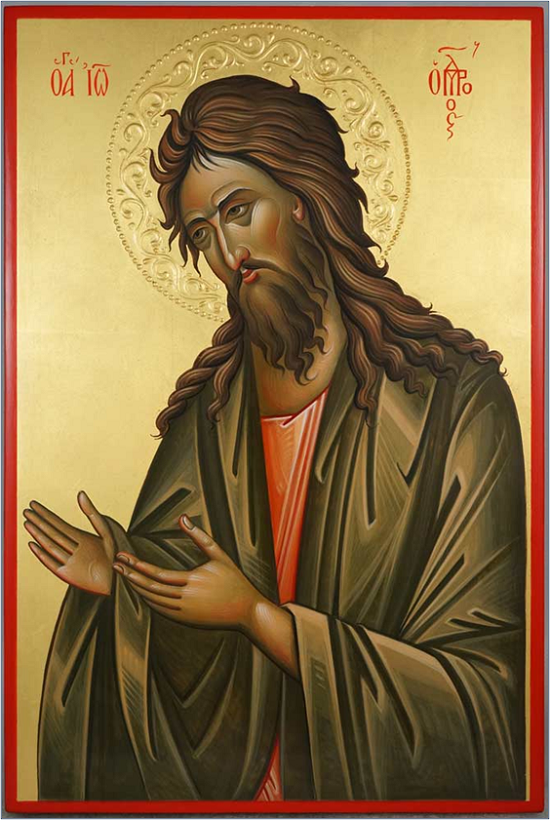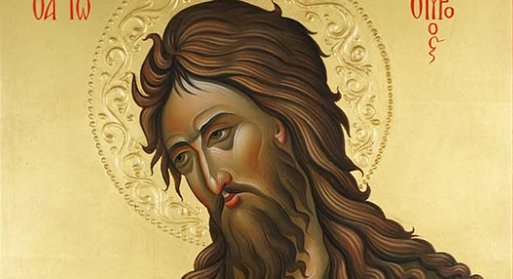Herald of the Nativity
Third Sunday of Advent Scripture Readings

Last weekend, we were introduced to John the Baptist through the eyes of Mark the Evangelist. Today, we’re invited to consider this man from the perspective of the Gospel of John. We must always keep in mind that John’s is the mystical gospel, more concerned with the meaning of the events surrounding the life, death, and resurrection of Jesus than any purely historical narration. For John, the events of Jesus’s life serve to focus our attention on the coming of the Messiah. Thus it is in today’s gospel reading.
The first two sentences of the gospel are taken from John’s Prologue, where he describes the emergence of a new creation, drawing parallels with the opening verses of the Book of Genesis and identifying the Messiah as the Word of God that brought creation into being. Whereas Genesis relates how God brought forth physical light out of darkness, John draws our attention to Jesus, who brings the light of life: the light of spiritual life and the light of eternal life. It’s the light of faith out of the darkness of unbelief.
In the middle of this new mystical creation story, we’re presented with John the Baptist. This isn’t one of the events that define and describe the earthly ministry of Jesus and his disciples. Rather, it belongs in the gospel’s exposition of God’s creative Word. The focus isn’t on “a man named John,” but on the fact that he was “sent from God.” In other words, the Baptist was destined from all eternity to have a role in the Incarnation of the Word of God. His role was to be the prophet “sent from God” who would be the first witness—the first man to emerge from the darkness of unbelief into the light of faith. For John the Evangelist, the witness of John the Baptist was as much a mystical event as an historical one.
The main body of the Gospel of John begins after the Prologue with verse nineteen, where it says, “And this is the testimony of John.” By beginning the narration of the public life of Jesus with John the Baptist, John the Evangelist follows an older tradition that we can still see in Mark’s gospel as well as in the Acts of the Apostles. We see that the gospels of Matthew and Luke contain the infancy narratives, but they were later accretions. The original “Good News” of the coming of the Kingdom began with John the Baptist’s witness. Was that because the Baptist was a prophet like those of old who bore witness to the coming of the Messiah? Was it because the life and work of the Baptist was still fresh in everyone’s memory and his reputation had spread throughout the Roman world? Or, perhaps, it was to make clear that John was the precursor and not the one who was to come.
Certainly, that last reason was foremost in the Evangelist’s mind when he wrote the words of this passage. In the Prologue, he stresses that the “man named John…was not the light but came to testify to the light.” Then, when the narrative begins, the gospel describes a delegation of “priests and Levites” who were empowered under the Torah to make religious decisions. They came ostensibly to hear for themselves who John was claiming to be and to see if his claims could be substantiated. Apparently, people had come to them and asked whether it were possible that John might be the Messiah since he was baptizing for the forgiveness of sins—something God alone could do. So, when they came to him, they asked, “Who are you?” They weren’t asking about his background; they were enquiring about his mission.
The gospel makes no bones about it: the first words out of the Baptist’s mouth are “I am not the Christ”—the Messiah. In the Gospel of John, this is a big deal. At various times in his ministry, Jesus proclaims, “I am.” This is more than just a simple self-identification. It’s a direct reference to God’s revelation of his sacred Name to Moses on Sinai—“I Am Who Am”—in Hebrew, Yahweh. Here, the Baptist proclaims, “I am not.” The delegation then proceeds to ask if he’s claiming to be Elijah, the precursor to the Messiah, or the Prophet who, they believed, would come like Moses to lead the people. According to the Evangelist, John refused all those titles. Did he even appreciate the full implications of his ministry? All of the gospels suggest that he did not. Clearly, he did identify himself with the herald voice who announced the coming of a new Exodus leading the people anew to freedom which was spoken of by the Prophet Isaiah.
Like what we saw in Mark’s gospel last week, the baptism of repentance for the forgiveness of sins that John practiced was not to be compared with Christian Baptism. They’re entirely different animals. John is quoted as saying, “I baptize with water.” The inference is that the baptism of the one who is to come after him will be radically different. The Baptism that the Messiah will bring is nothing less than an immersion into the life of the Holy Spirit of God himself.
So, other than setting the stage for Jesus’s life and ministry, why are we asked during this season of Advent to focus our attention on John the Baptist and his ministry? I believe that it’s to remind us of who we are. We’re much more than simply God’s people called to repentance and gifted with forgiveness. I’ve said many times over in my reflections on our weekly Scripture readings that the gospels don’t just tell us the story of Jesus. If that were the extent of it, we could read it once and go on to something else. Rather, if we’re serious about our having been Baptized into the Holy Spirit, then we share that one Spirit with Jesus and with one another. The gospels therefore tell us not only Jesus’s story but our own. It’s our own growing pains and struggles, our own passion, death, and resurrection that we encounter here.
If the gospels tell our own story, then what about the Feast of the Nativity that we’re preparing to celebrate? What sort of celebration should it be? It’s certainly not the birthday party that some have tried to make it into. In fact, we have no clear idea when the historical event of Jesus’s birth took place. It wasn’t on the twenty-fifth of December. Scholars’ best guess would be sometime in mid-April. No. This is the celebration of a new creation—a creation that began with Jesus and continues in and through each one of us. The Feast of the Nativity is our reminder that we’ve been reborn and, with us, all of humankind. Our Baptism into Christ Jesus such that “It is no longer I who live but Christ who lives in me” [Galatians 2:20] eclipses John’s baptism of repentance and forgiveness. The Nativity we celebrate is our own spiritual birth. And this season of Advent we experience in preparation for that Nativity is our reminder of where we came from, where we’re going, and who we are.
As the priests and Levites approach you today and ask you, “Who are you” what are you going to tell them? When they ask you, “Are you the Christ the Son of the Living God?” what will you say? We’ve been Baptized into Christ Jesus. We’ve been given the Holy Spirit of God who raised the Lord Jesus from the dead. Don’t be afraid to answer them truthfully. When they ask, tell them, “I am.”
Get articles from H. Les Brown delivered to your email inbox.
